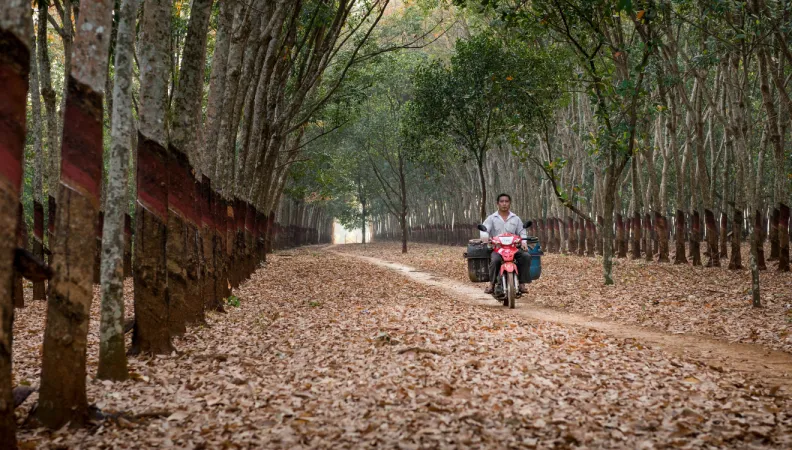Share the page
Cambodia: 20 years of AFD Support for Rubber Producers
Published on

Since 1999, AFD has been supporting a sustainable and inclusive rubber industry in Cambodia. With the signature of a new project, which will assess the consequences of climate change for the sector, we review AFD support.
In Cambodia, agriculture represents 22% of the GDP – making it a very important sector. In addition to the "white gold" - rice, which accounts for 67% of the total cultivated area - the country boasts other natural resources, such as rubber plantations, which amounted to some 450,000 hectares in 2015.
However, in order for the rubber sector to benefit the most vulnerable, it is essential to support small family farms, which requires technical training for future smallholders, the formation of cooperatives and financial support.
The sector is also facing the consequences of climate change, the scarcity of labor and the need to develop a more sustainable sector.
AFD has been working alongside the Royal Government of Cambodia for over 20 years to support the sector and help it overcome these economic, social and environmental challenges, particularly with the Directorate General of Rubber Farming and the Rubber Research Institute of Cambodia (IRCC).
Enabling the development of family rubber farming
AFD has been supporting the development of family rubber farming in Kampong Cham Province since 1999. This pilot project aimed to test the most appropriate technical, institutional and financial solutions for the growth of small rubber plantations. It helped 370 families.
This support continued in the following years with several projects to support family-run rubber plantations and to structure producers, notably through the creation of a national producers' association, but also through the implementation of certifications.
More recently, AFD supported a project to help small family farms obtain regulated and certified strains. As a result, 128 plantations were analyzed, amounting to 120 hectares, and more than 1 million strains. This has resulted in a better purchase price, higher yields and greater resistance of the plantations thanks to the improvement of the genetic material of the strains. The project has also led to the creation of a reference wood garden at the IRCC.
Improving resilience to climate change
AFD's support to the sector does not stop there. Recently, several programs have been launched to support the development of the sector and its resilience to climate change.
The latest project, FORSEA (FOrecasting impacts of climate change and workforce availability on natural Rubber commodity chain in South-East Asia), seeks to contribute to the adaptation of Cambodia, Thailand and Vietnam to the consequences of climate change by documenting its consequences (technical, social and economic). This data will be shared with stakeholders in these sectors at different levels of decision-making.
Further Reading: Managing the Mekong River Basin to Deal with the Effects of Climate Change
Funded by a 1.5 million euro grant from AFD and implemented by the Centre de coopération internationale en recherche agronomique pour le développement (CIRAD), FORSEA will also help anticipate the effects of the scarcity of agricultural labor in the rubber sector.
Supporting sustainable rubber production
"The diversity of our backing has enabled us to support the development of family-run rubber plantations for over 20 years,” says Ophélie Bourhis, AFD's Country Director in Cambodia. It has also allowed us to “work on new issues such as adaptation to climate change and the transition of the sector, which are just as important for the sustainable development of Cambodia.”
In the Greater Mekong region, changes in rubber production methods are having major social and environmental consequences due to growing demand: foreign companies are setting up in direct competition with small-scale producers (who are still in the majority). They are more vulnerable to price fluctuations, deforestation, forest degradation and pollution.
In response, AFD is financing a project implemented by WWF in three Southeast Asian countries, including Cambodia, to support small producers in their transition process. The aim is to achieve sustainable rubber production that benefits both biodiversity and the quality of life of these small producers.
